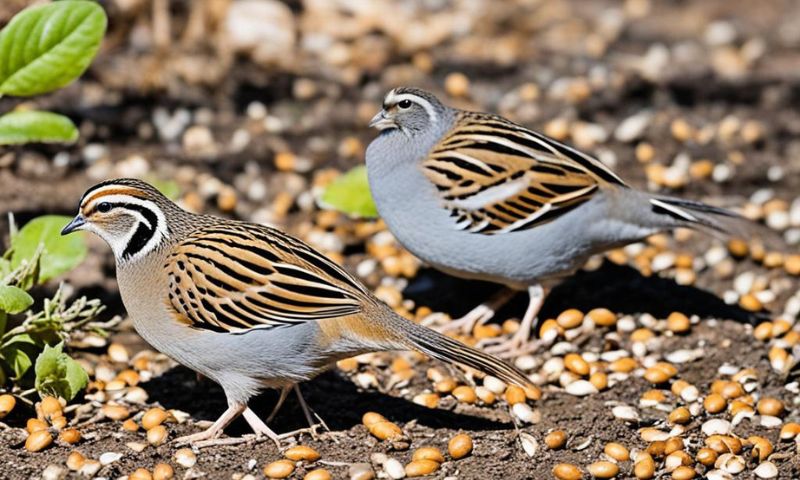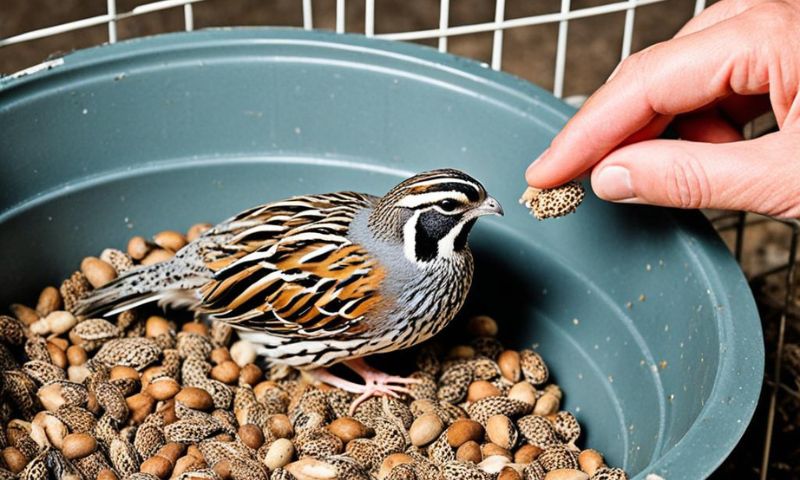The Effects of Overfeeding and Underfeeding Quails
Proper nutrition and care are vital for the health and well-being of quails. Overfeeding and underfeeding can have significant impacts on these birds, affecting their growth, productivity, and overall health. It is crucial to understand the importance of quail diet care and establish optimal feeding habits to ensure their optimal development.
Quails have specific feeding habits that should be considered when designing their diet. By providing them with the right balance of nutrients, quails can thrive and reach their full potential. However, overfeeding can lead to obesity, health issues, and reduced productivity in these birds. On the other hand, underfeeding can result in poor growth and reduced egg production.
In this article, we will delve into the dangers of overfeeding quails and the detrimental effects of underfeeding. We will also provide practical advice on how to prevent these issues through proper quail feed management and feeding techniques. By implementing these strategies, quail owners can ensure the well-being of their birds and maximize their potential.
Understanding Quail Feeding Habits
When it comes to feeding quails, understanding their natural feeding habits is crucial for maintaining optimal quail health and growth. By aligning our feeding practices with the dietary needs of these birds, we can ensure that they receive the right balance of nutrients for their well-being. Here are some important tips on how to feed quails correctly, with a focus on optimal quail feeding practices and quail nutrition tips.
Quail Feeding Habits
Quails are ground-dwelling birds known for their foraging behavior. In the wild, they primarily feed on a variety of seeds, insects, and vegetation. Mimicking their natural diet is essential to provide them with the necessary nutrients. When feeding quails in captivity, it is important to consider the following:
- Offer a balanced diet: Quails require a balanced diet that includes a mix of grains, seeds, greens, and protein sources. Providing a varied diet ensures that they receive all the essential nutrients necessary for their growth and development.
- Feed in small portions: Quails have a fast metabolism, and feeding them in small portions multiple times a day is ideal. This helps prevent wastage and ensures that they have access to fresh and nutritious food throughout the day.
- Provide clean water: Quails, like any other bird, need access to clean water at all times. Make sure to provide a water source that is easily accessible to them and replace it regularly to maintain its freshness.
Optimal Quail Feeding Practices
To establish optimal quail feeding practices, consider the following:
- High-quality feed: Ensure that the feed you provide is specifically formulated for quails. Look for feeds that meet the nutritional requirements of quails and provide a good balance of protein, vitamins, and minerals.
- Supplement with greens: Quails enjoy and benefit from fresh greens in their diet. Add leafy greens, such as spinach, kale, or lettuce, to their feed or provide them as a separate treat.
- Monitor feed intake: Keep an eye on the amount of feed your quails consume. It is important not to overfeed or underfeed them. Adjust the quantity as necessary to maintain a healthy body condition.
By understanding their natural feeding habits and implementing optimal quail feeding practices, you can ensure that your quails receive the proper nutrition they need. This will promote their overall health, growth, and productivity.

| Benefits of Optimal Quail Feeding Practices | Consequences of Poor Quail Feeding Practices |
|---|---|
| 1. Healthy growth and development | 1. Malnutrition and stunted growth |
| 2. Improved egg production | 2. Decreased egg production or poor egg quality |
| 3. Enhanced disease resistance | 3. Increased susceptibility to diseases |
| 4. Consistent weight management | 4. Obesity or underweight condition |
The Dangers of Overfeeding Quails
Overfeeding quails can have detrimental effects on their health, leading to obesity, health problems, and reduced productivity. It is important to understand the dangers of overfeeding and implement proper quail feed management techniques to ensure the well-being of these birds.
The Risks of Obesity
One of the primary dangers of overfeeding quails is the risk of obesity. Just like humans, quails can become overweight if they consume more food than their bodies require. Excessive weight gain puts strain on their joints and can lead to mobility issues. Additionally, obese quails are more prone to heart disease and liver problems, which can ultimately decrease their lifespan.
Health Problems
Overfeeding can also lead to various health problems in quails. When their diets consist primarily of high-calorie, low-nutrient foods, such as seeds and grains, they may develop deficiencies in essential vitamins and minerals. This can result in weakened immune systems, increased susceptibility to infections, and poor overall health.
Reduced Productivity
Overfeeding quails can negatively impact their productivity, especially when it comes to egg-laying. Excess weight gain can disrupt their hormonal balance, resulting in irregular or decreased egg production. Additionally, obese quails may experience difficulties in breeding and have lower fertility rates, affecting the growth and maintenance of quail populations.
To avoid overfeeding quails and minimize the associated risks, it is crucial to practice proper quail feed management techniques. This includes:
- Providing a balanced diet rich in essential nutrients, including proteins, vitamins, and minerals.
- Monitoring and regulating feed quantities to prevent overconsumption.
- Establishing a feeding schedule to ensure regular, measured meals.
- Consulting with a veterinarian or quail nutrition expert for personalized advice on feed types and quantities.
By following these proper quail feeding techniques and managing their feed intake carefully, quail owners can maintain their birds’ health, productivity, and overall well-being.

Preventing Underfeeding in Quails
Proper quail feed management is crucial to prevent underfeeding in quails. Undernutrition can have detrimental effects on their health, growth, and egg production. To ensure the well-being of your quails and maximize their potential, follow these practical techniques:
- Provide a balanced diet: Offer a nutritionally complete and balanced feed that meets the specific nutritional requirements of quails at different stages of development. Consult a poultry nutrition expert or refer to reputable sources to determine the ideal feed composition.
- Monitor feed intake: Keep track of how much feed your quails consume daily. Regularly observe their feeding behavior and adjust the feed quantity accordingly to ensure they are receiving enough nutrients without overfeeding. This will help in preventing undernutrition.
- Offer feed at appropriate times: Establish a consistent feeding schedule that aligns with the natural feeding habits of quails. Dividing the daily feed into multiple small portions throughout the day can promote healthy eating patterns and prevent underfeeding.
- Ensure feed accessibility: Make sure the quails can easily access their feed without any hindrance. Avoid overcrowding and provide an adequate number of feeding stations to prevent competition for food, which can lead to undernourishment in some individuals.
- Observe quail behavior: Regularly observe the behavior and appearance of your quails to detect any signs of undernutrition, such as weight loss, reduced egg production, or decreased activity levels. Early intervention can prevent further health complications.
- Consult a veterinarian: If you suspect underfeeding or notice any abnormal changes in your quails’ health or reproductive performance, seek professional advice from a veterinarian experienced in poultry care. They can provide guidance on optimizing feed management and address any specific nutritional needs.
By implementing these proper quail feeding techniques and managing their feed effectively, you can minimize the risk of underfeeding and promote the overall health and well-being of your quails.
Optimal Quail Feed Management
Proper quail feed management is crucial to ensure the health and well-being of your quails. By adopting the right feeding practices, you can provide your birds with the essential nutrients they need for growth, productivity, and overall vitality.
Here are some key aspects to consider for optimal quail feed management:
Choosing the Right Feed
Quails require a balanced diet that meets their nutritional requirements. When selecting feed for your quails, opt for commercially available feeds specifically formulated for quails. These feeds are designed to provide the necessary protein, vitamins, and minerals essential for their growth and health.
Establishing Feeding Schedules
Creating a consistent feeding schedule is essential to ensure your quails receive regular and adequate nutrition. Quails thrive on routine, so establish specific feeding times that align with their natural feeding habits. Maintaining a consistent schedule helps regulate their metabolism and prevents overfeeding or underfeeding.
Monitoring Feed Intake
Regularly monitor your quails’ feed intake to ensure they are consuming the recommended amount of food. Keep an eye out for any sudden changes in appetite, as it could indicate underlying health issues. Monitoring feed intake allows you to adjust the amount of feed provided to meet the specific needs of your quails.
Adjusting Feed Quantities
Quails have varying nutritional requirements depending on their stage of development and reproductive cycle. Adjusting feed quantities accordingly ensures that each quail receives the appropriate amount of feed based on their individual needs. Consult with a veterinarian or avian nutritionist for guidance on adjusting feed quantities based on your quails’ specific requirements.
Proper quail feed management is crucial to ensure the health and well-being of your quails.
By implementing these optimal quail feed management techniques, you can promote the overall health and productivity of your quails. Remember to consider their natural feeding habits, choose the right feed, establish feeding schedules, monitor feed intake, and adjust feed quantities based on their requirements. Providing individualized care and attention to their nutritional needs will help prevent the risks of overfeeding and underfeeding, ensuring your quails thrive in their environment.
Conclusion
Proper quail feeding practices play a crucial role in the health and productivity of these birds. Overfeeding and underfeeding can have detrimental effects on their overall well-being. By understanding the natural feeding habits of quails and implementing optimal feeding techniques, quail owners can ensure that their birds receive the right balance of nutrients.
Overfeeding quails can lead to obesity, health issues, and decreased productivity. It is important to avoid overfeeding by practicing quail feed management and monitoring their feed intake. Similarly, underfeeding can negatively impact quail growth, health, and egg production. To prevent underfeeding, quail owners should establish proper feeding schedules and adjust feed quantities as needed.
Optimal quail feed management involves selecting the right feed, considering individual nutritional needs, and implementing effective feeding techniques. By following these practices, quail owners can provide their birds with the best possible nutrition while avoiding the risks associated with overfeeding or underfeeding. By prioritizing quail health and nutrition, owners can maximize their birds’ potential and ensure their well-being.
FAQ – Overfeeding and Underfeeding Quails
What are the effects of overfeeding and underfeeding quails?
Overfeeding quails can lead to obesity, health issues, and reduced productivity. Underfeeding quails can result in poor growth, malnutrition, and decreased egg production.
What are the optimal quail feeding practices?
Optimal quail feeding practices include understanding their natural feeding habits, providing a balanced diet, establishing feeding schedules, monitoring feed intake, and adjusting feed quantities based on their needs.
How can I avoid overfeeding quails?
To avoid overfeeding quails, practice proper quail feed management by measuring and controlling feed quantities, using appropriate feeders, and monitoring their body condition to ensure they maintain a healthy weight.
How can I prevent underfeeding in quails?
To prevent underfeeding in quails, ensure they have access to sufficient feed and water at all times, use appropriate feeders and waterers, and regularly assess their body condition and productivity to adjust their feed intake accordingly.
How do I manage quail feed effectively?
Optimal quail feed management involves selecting the right feed based on their nutritional requirements, establishing feeding schedules, monitoring their feed intake, and adjusting feed quantities as needed. Individualized care is crucial to avoid overfeeding or underfeeding.